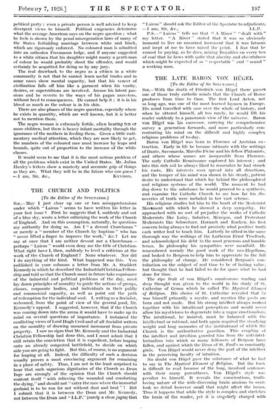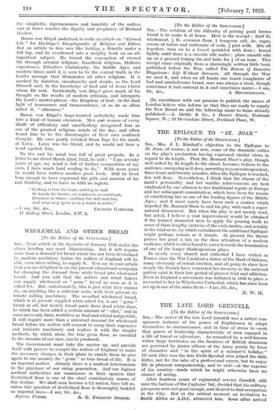THE LATE BARON VON HtGEL
[To the Editor of the SPECTATOR.] SIR,—With the death of Friedrich von Hiigel there passes one of those truly catholic minds that the Church of Rome produces from time to time. The first Lord Acton, not so long ago, was one of the most learned laymen in Europe. His mind travelled with ease over the whole of history, and when he uttered himself, all too rarely, he would lift his reader suddenly to a panoramic view of the universe. Baron von Hugel was 'his successor, carrying the comprehensive survey a generation forwards, and more particularly con- centrating his mind on the difficult and highly complex religious problems of to-day.
Baron von Hfigel was born in Florence of Austrian ex - traction. Early in life he became intimate with the writings of Dante, Savonarola, Marsilio Ficine and his fellow Platonists, and others whose names are inseparable from Florence. The early Catholic Renaissance captured his interest ; and into this rich soil he always liked to remember he had struck his roots. His interests soon Spread into all directions, and the temper of his mind was shown in his steady, patient desire to understand that which lay behind the philosophical and religious• systems of the world. The moment he had dug down to the substance he would proceed to a synthesis, and examine the Catholic Church to see how far his dis- coveries of truth were included in her vast scheme.
His religious studies led him to the heart of the Modernist Movement with which he showed a deep sympathy. He approached with no sort of prejudice the works of Catholic Modernists like Loisy, Sabatier, Menegoz, and Protestant Modernists like Schweitzer, Harnach and Eucken, his first concern being always to find out precisely what positive truth each writer had to teach him. Latterly he sifted in the same thorough way the writings of the Lutheran Ernst Tmeltsch, and acknowledged his debt in the most generous and humble terms. In philosophy his sympathies were manifold. Ile remembered warmly the good work of the neo-Hegelians, and looked to Bergson to help him to appreciate to the full the philosophy of change. He considered Bergson's con-. tribution on the subject of real time to be of lasting value, but thought that he had failed to do for space what he had done for time.
The ripe fruit of von Hfigel's omnivorous reading and deep thought was given to the world in his study of St. Catherine of Genoa which he called The Mystical Element of Religion. His choice of St. Catherine revealed that he was himself primarily a mystic, and mystics like poets are born and not made. But his strong intellect always worked together with his intuitional perceptions and would never allow his mysticisms to degenerate into a vague emotionalism. The intuitional, he insisted, must be balanced with the intellectual or rational, and both again required the steadying weight and long memories of the institutional of which the Church ' is the authoritative guardian. This coupling of the intellect and intuition guarded him from the anti-intel- lectualism into which so many followers of Bergson have fallen, and against which the Dean of St. Paul's so constantly girds. Von Hugel would never deny the part of the intellect in the perceiving faculty of intuition.
No doubt von Hugel gave the substance of what he had to say in The Mystical Element of Religion. But the book is difficult to read because of the long, involved sentences with their many parentheses. Von • Hilgel's style was peculiar to himself. It reveals the conscientious, truth- . loving nature of the wide-discerning brain anxious to over- look no detail however small that might affect the issues. Thus it happens that while the style is complex and stretches the brain of the reader, yet it is singularly charged with the simplicity, ingenuousness and humility of the author, and at times reaches the dignity and pregnancy of Richard Hooker.
Baron von Hugel undertook to write an article on "Eternal Life" for Hastings's Encyclopaedia of Religion and Ethics. But an article to him was like holding a thimble under a full tap, and he overflowed into a weighty book on an all- important subject. He traced the conception of eternal life through oriental religions, Israelitish religions, Hellenic experiences, Primitive Christianity, the Middle Ages, and modern times until it is seen to be the central truth in the Lord's message that illuminates all other religions. It is marked by duration, simultaneity and stands, as the Lord Himself said, in the knowledge of God and of Jesus Christ whom He sent. Incidentally von Hfigel gives much of his thought on the results of modern criticism, and interprets the Lord's master-phrase—the Kingdom of God—in the dual light of immanence and transcendence, or as he so often called it, " otherness."
Baron von Hiigel's large-hearted catholicity made him into a kind of human eirenicon. Men and women of every shade of orthodoxy and unorthodoxy recognized him as one of the greatest religious minds of the day, and often found him to be the disentangler of their own confused thought. He once gently rebuked Dean Inge for his snarls at Loisy. Loisy was his friend, and he would not hear a word against him.
To the end his mind was full of great projects. In a letter to me dated March 22nd, 1922, he said : "I am seventy years of age, my mind is full of further composition of my own, I have much hard reading to do." With more years he would have written another great book. Still he lived long enough to have expressed the pith and marrow of his rich thinking, and to leave us with no regrets.
"Nothing is here for tears, nothing to wail Or lmnek the breast ; no weakness, no contempt, Dispraise or blame.; nothing but well and fair, And what may quiet US in a death so noble."
.--I am, Sir, &C., CHARLES GARDNER.
17 Halsey Street, London, S.W. 3.











































 Previous page
Previous page